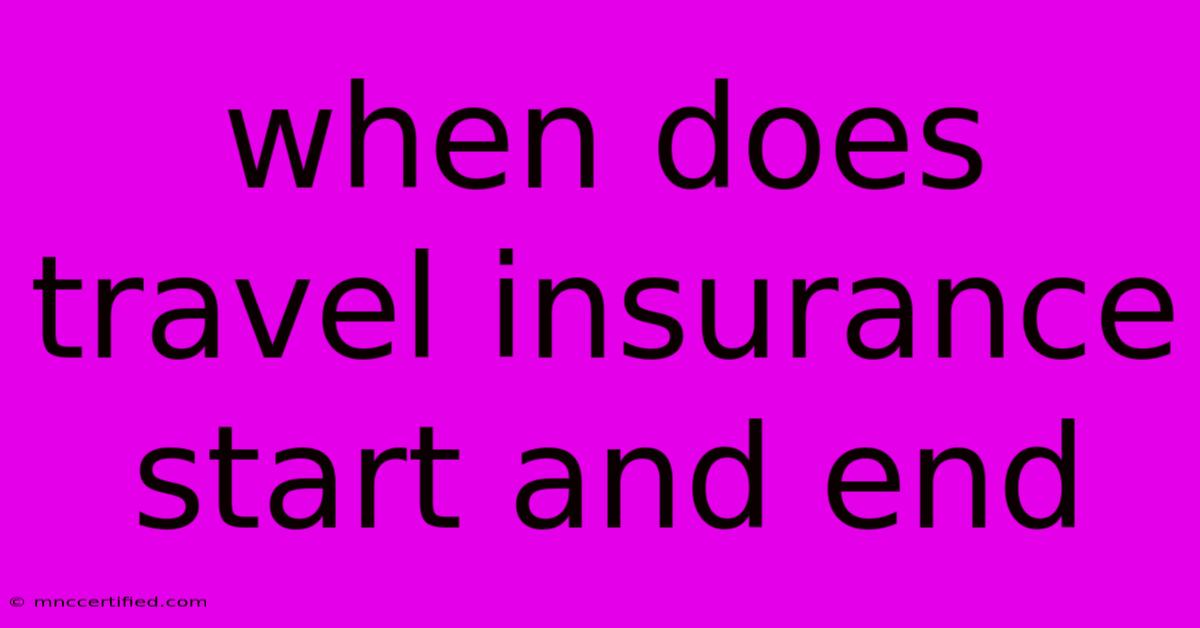When Does Travel Insurance Start And End

Table of Contents
When Does Travel Insurance Start and End? A Comprehensive Guide
Planning a trip is exciting, but it's essential to ensure you're covered in case the unexpected happens. Travel insurance provides peace of mind, but understanding when it kicks in and when it ends is crucial. This guide will delve into the key aspects of travel insurance coverage periods, helping you make informed decisions about your policy.
The Importance of Knowing Your Coverage Dates
Travel insurance doesn't automatically start the moment you book your trip. It's vital to be aware of the specific coverage periods, as your claim could be denied if you're not covered at the time of the incident.
Understanding the Start Date
Your travel insurance policy's start date is usually determined by:
- The policy's effective date: This is the date your policy becomes active and coverage begins.
- The time you purchase the policy: Some policies activate immediately upon purchase, while others may have a waiting period before coverage starts.
Important note: Be sure to check your policy documents to determine the exact start date and any relevant waiting periods.
When Does Coverage End?
Your travel insurance policy's end date is typically based on:
- The policy's expiry date: This is the date your policy ceases to be valid, and coverage ends.
- The end date of your trip: Many policies cover you for the duration of your trip, from the time you leave home to the time you return.
- Specific events: Some policies may have coverage for events that occur after your trip, such as delayed baggage or cancelled flights.
It's vital to review your policy to determine the specific end date and any events that might affect your coverage.
Understanding the Coverage Periods
1. Pre-Trip Coverage:
- This covers events that occur before you depart for your trip, such as:
- Cancellation or interruption due to illness or injury
- Lost or stolen travel documents
- Medical emergencies requiring you to postpone the trip
2. Trip Coverage:
- This covers events that occur during your trip, such as:
- Medical emergencies
- Baggage loss or theft
- Flight delays or cancellations
- Personal liability for accidents
3. Post-Trip Coverage:
- This covers events that occur after your trip, such as:
- Delayed baggage arriving after you return home
- Cancelled flights after your original departure date
4. Extension Options:
- Some insurers offer policy extensions that can provide coverage beyond the initial duration. You may need to pay an extra fee for this option.
Tips for Maximizing Your Travel Insurance Coverage
- Purchase your policy well in advance: This will ensure you're covered from the start, including any pre-trip events.
- Read your policy carefully: Understand the exact start and end dates, coverage limitations, and any exclusions.
- Keep a copy of your policy: Carry a digital or physical copy of your policy with you during your trip.
- Contact your insurer: If you have any questions about your coverage, reach out to your insurer for clarification.
Conclusion
Knowing when your travel insurance starts and ends is crucial for protecting yourself financially during your trip. By understanding your coverage periods, you can ensure that you're adequately protected in case of unexpected events. Remember to review your policy carefully and contact your insurer for any questions or concerns.

Thank you for visiting our website wich cover about When Does Travel Insurance Start And End. We hope the information provided has been useful to you. Feel free to contact us if you have any questions or need further assistance. See you next time and dont miss to bookmark.
Featured Posts
-
Does My Insurance Cover Physical Therapy
Nov 08, 2024
-
Cost Of Pelvic Ultrasound With Insurance
Nov 08, 2024
-
Westbrooks Confidence Soars Post Game
Nov 08, 2024
-
Holland America Travel Insurance Reviews
Nov 08, 2024
-
Redmaynes Unexpected Role A Surprise
Nov 08, 2024